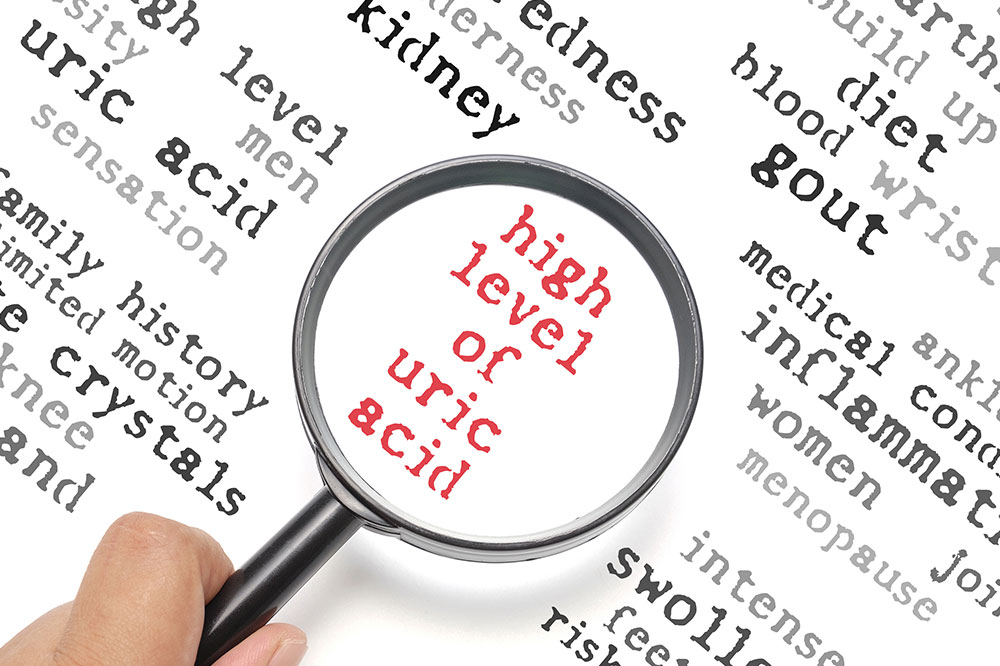
High uric acid levels – Signs and management options
Uric acid is naturally produced and released by the body as a byproduct of certain foods and beverages one has. The kidneys generally filter this byproduct from the bloodstream and flush it out with urine. However, if this does not happen, excessive uric acid in the body causes minute crystals to form and accumulate at the base of joints, leading to pain and discomfort. Nevertheless, one can manage and lower uric acid levels.
Signs of high uric acid levels
Uric acid build can trigger the following physical symptoms developing with varied levels of intensity:
Joint problems: Swelling in the joints is one of the first indicators of uric acid buildup. One can observe this change and notice discoloration along the joints where the skin becomes shiny due to the buildup of uric acid crystals. The affected area might feel warm to the touch. The swelling can cause pain if left unchecked.
Kidney stones: Kidneys process out the waste from the body. So, there is a high risk of uric acid buildup in the kidney that, if left unchecked, can even turn into stones. Some of the primary signs of these complications are pain in the lower back, side, abdomen, or even groin. One might also experience difficulty urinating and notice a foul smell. Blood in urine and nausea are also signs of kidney stones.
Pain in the big toe: Gout is one of the risks associated with a high buildup of uric acid. The crystals accumulate in the joints of the big toe, causing persistent pain and discomfort. However, gout can develop in any of the joints, as the crystals may continue to build up between the tissue and the cartilage. One may also notice redness and swelling in the affected areas.
One should not ignore intense flareups and persistent pain associated with the symptoms of high uric acid concentration in the body. They should immediately consult a doctor on experiencing any such symptoms.
Ways to lower uric acid levels
In addition to prescriptions and other treatments, one can consider trying a few simple and quick home remedies to lower and manage uric acid levels. Here are some natural ways to lower excessively high uric acid levels in the body:
Limiting red meat and seafood: Red meats like beef, lamb, veal, and venison; organ meats like liver or sweetbreads; fish like anchovies, sardines, tuna, and shellfish; poultry-based food are all rich sources of purine. When purine is digested in high quantities, it triggers a natural release of uric acid in the blood. This blood gets circulated, depositing uric acid buildups at vital joints. Limiting the intake of red meat and seafood can lower the risk of uric acid buildup.
Avoiding refined sugar: Sugar, in all forms, including natural fructose, releases high amounts of purine in the bloodstream when digested. Sweets, baked goods, and other store-bought confectionaries are rich in refined sugars that should be only eaten in moderation. Even sugary beverages like flavored sodas, soft drinks, fruit juices, and carbonated beverages contain high amounts of sugar that can impact overall blood glucose levels.
Increasing coffee intake: Caffeine intake is believed to lower uric acid levels in the body. Caffeine reacts with the enzyme that breaks down purine in foods and beverages. This helps lower the uric acid levels in the body naturally. Also, caffeine promotes better processing of uric acid through frequent urination allowing the body to flush out toxins.
Adding fiber to daily nutrition: Fiber is an excellent nutrient that helps the body digest foods and beverages. Whole grains, whole vegetables, and whole fruits like chickpeas, lentils, brown rice, quinoa, oats, broccoli, spinach, apples, pears, and even assorted nuts can boost fiber intake. Adding fiber-rich food helps the body flush out uric acid and maintain healthy blood glucose levels.
Increasing water intake: Hydration is crucial for lowering uric acid deposits in vital joints. Water in the bloodstream can help carry the uric acid to the kidneys to be processed through urination. Drinking more water also enables frequent urination, and as a result, the body is able to flush out more toxins effectively. Adults must have at least 8 to 10 glasses of water.
Lifestyle changes
Doctors may also suggest a few healthy lifestyle changes to lower excessively high uric acid levels in the body. These include regular exercise, eliminating substances that harm the body, and following a healthy meal regimen. Further, staying hydrated and adopting a healthy lifestyle can automatically boost immunity and prevent further complications of high uric acid levels.




